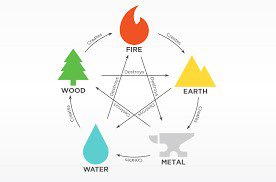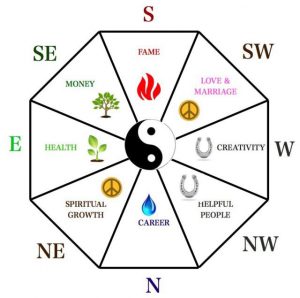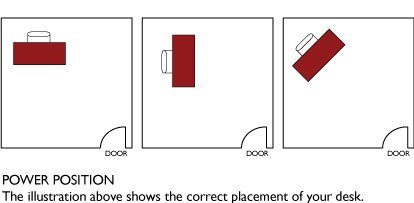Experimenting with Feng Shui

A large part of architecture is arranging: arranging buildings on a site, circulation in a building, equipment and activities within a room, etc.
It’s fascinating to study how different cultures approach design, or shall we say “arrangement,” challenges. Feng Shui is one such philosophy and this article suggests a few small ways you can implement its concepts in your home or office.
Feng Shui can be traced back thousands of years in China. It was initially used to identify safe places to settle where families would be able to flourish. Later on it was used to site palaces, government buildings, monuments, and even entire cities. So what does Feng Shui have to offer us today, when arranging our living and working spaces?
Well, the forces that Feng Shui identified thousands of years ago are still a struggle for the modern human to balance: health, money, love, creativity, etc. Feng Shui associates each of these elements with a specific location on a “bagua,” or compass. The compass establishes where these elements need to be placed in your home or office to achieve a certain effect.
Feng Shui practitioners have translated the theory into some practical considerations, many of which you can easily incorporate into your office arrangement.
Consider what is behind you
Strong backing is important when sitting at a desk for long periods of time; it is associated with keeping your personal energy levels up. If you have your back to a window or door, your energy will be weak. To remedy this situation, try repositioning your chair and desk so that you have a wall to your back. If this isn’t an option for your space, place a strong piece art or large plants to create a stronger backing. By having a strong backing, it helps you feel safe and allows you to see people coming.
Suggested desk locations from Feng Shui & Beyond.
Is there something to look at?
The first thing you see sets the mood for you when you enter a space. A piece of art or family photo can be extremely uplifting. Also, if you have access to a window, position your desk so that you can see out of it. Looking out of a window can reduce stress because your eyes relax when looking into the distance.
What is the quality of air like?
When you take a deep breath in your office what is the first thing that you notice? If you notice odd smells or just something off, consider bringing in some plants to help purify the air in your office and add beauty. East, southeast & south bagua areas are recommended for plant placement. Different plants have different associations, for instance, bamboo with luck and jade plants with money.
Is there clutter on your desk?
You may not be aware of it, but when you walk in a room, you automatically react to it. You may feel peaceful and relaxed or tense and sad, all because the room is out of balance. Clutter is considered a hindrance to having good Feng Shui energy in your space. Piles of unread mail or incomplete paper work covering flat surfaces drain your energy. In Feng Shui clearing away clutter leads directly to feelings of relaxation. Practitioners have then suggested how to apply the “bagua” to the desk itself, helping place items for greater productivity and balance.
Can Feng Shui guarantee wealth, health or happiness? Probably not. But we architects like to think that thoughtful “arrangement” does make a difference in one’s quality of life. Ancient Chinese philosophy seems to agree.
Featured Resource

Developing a Realistic Project Budget
"Getting your Ducks in a Row" E-booklet 4
Download E-BookletCategories
- SOA News & Events
- Interior Design
- Case Studies
- Sites & Landscaping
- Sustainable Design
- Adaptive Reuse / Renovation
- Design Nuts & Bolts
- Ownership, Operations & Maintenance
- Energy Efficiency
- Making a Great Project Team
- "Building" your Business
- Dollars & Sense




